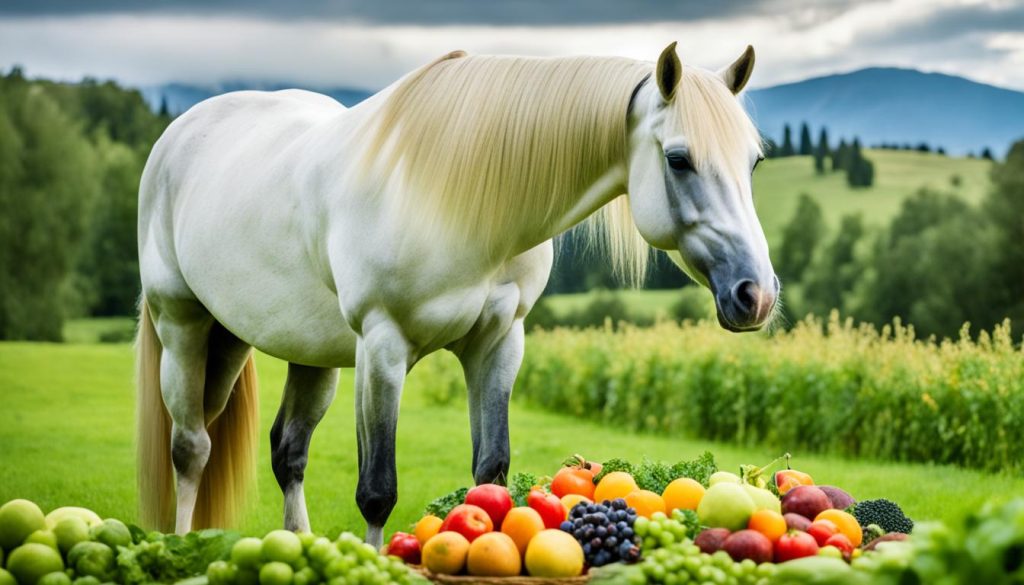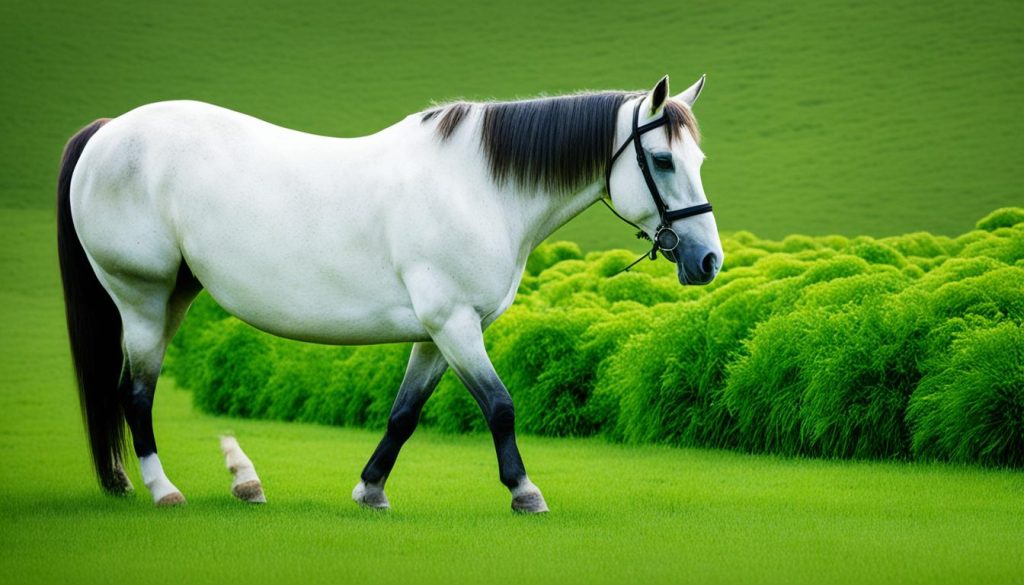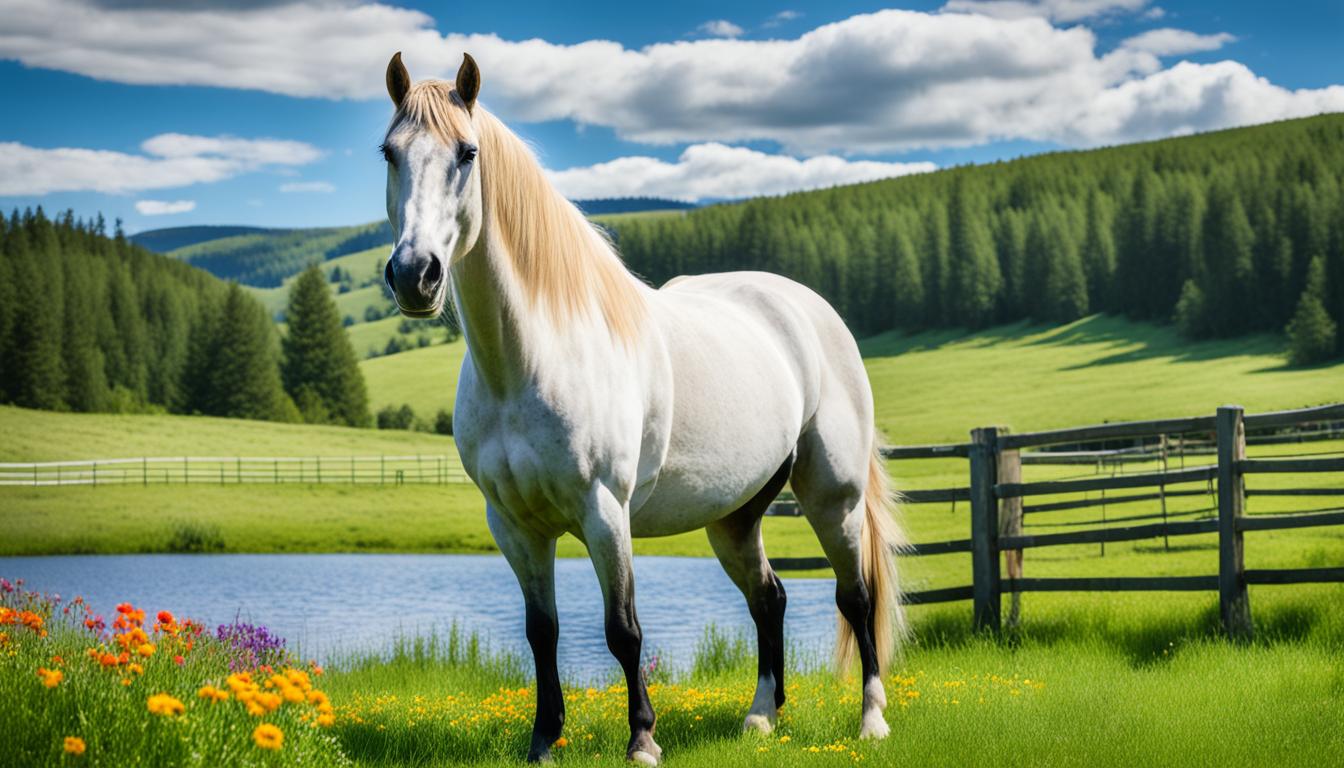A healthy and well-nourished horse is the cornerstone of equine wellness and performance. Did you know that a horse’s diet can directly impact its overall health and longevity? From the right balance of nutrients to understanding sensitivities, it’s essential to be well-informed about horse health and nutrition to give your horse the best care possible.
In this article, we will provide you with crucial tips on horse health and nutrition to help you keep your beloved equine companion in optimal condition. Whether you’re new to horse ownership or a seasoned equestrian, these insights will ensure that you have the knowledge and tools to provide the best possible care for your horse’s well-being.
Key Takeaways:
- A well-balanced diet is fundamental for horse health and nutrition.
- Moderate intake of carbohydrates and fats is crucial to prevent potential health issues.
- Protein requirements vary based on the horse’s lifestyle and activity level.
- Supplementing with minerals and vitamins can ensure optimal horse health.
- Avoid excessive grain feeding to maintain digestive health.
Aim for a Balanced Diet
The bulk of your horse’s daily nutrition comes from fresh or dried grass. It is important to provide high-quality forage or hay that contains the necessary nutrients for horse health. In addition to forage, horses need a balanced diet that includes carbohydrates, fats, proteins, vitamins, minerals, and water. Working with a trainer and veterinarian can help determine the ideal portions of these nutrients for your horse.
When it comes to horse nutrition tips, ensuring a horse dietary balance is crucial. The foundation of your horse’s diet should be high-quality forage or hay. This provides the essential fiber, vitamins, and minerals that horses need on a daily basis. Look for forage that is fresh, free from dust and mold, and appropriate for your horse’s age and activity level.
In addition to forage, horses require a mixture of carbohydrates, fats, and proteins to support their overall health and performance. Carbohydrates provide energy, while fats serve as a concentrated source of calories. Proteins are essential for muscle development and repair.
Horse feed options can vary based on your horse’s specific needs. Some horses may require additional concentrates, such as grains or pellets, to meet their nutritional requirements. Others may thrive on a forage-only diet. Consulting with a trainer and veterinarian can help you determine the right balance of feeds for your horse.
Proper nutrition is key to maintaining your horse’s health and well-being. It is important to provide a balanced diet that meets the nutritional needs of your horse. A well-balanced diet will support their immune system, promote healthy digestion, enhance muscle development, and provide the energy they need to perform at their best.
When formulating your horse’s diet, consider their age, activity level, and any specific dietary restrictions or sensitivities they may have. It’s important to monitor your horse’s body condition and adjust their feed accordingly to ensure they maintain an ideal weight.
Remember to always provide a fresh source of clean water for your horse. Water is essential for digestion, nutrient absorption, and overall hydration. A horse requires approximately 10-12 gallons of water per day, depending on their size, workload, and environmental conditions.
Achieving a balanced diet for your horse may require some trial and error. Observing their body condition, performance, and overall health will help guide you in making adjustments and fine-tuning their diet as needed.

Everything in Moderation
When it comes to horse nutrition, balance is key. While carbohydrates, fats, and grains are important components of a horse’s diet, they should be provided in moderation to ensure optimal health and prevent potential issues. Understanding your horse’s sensitivities and dietary needs is essential for their well-being.
Carbohydrates: The Energy Source
Carbohydrates are a primary source of energy for horses, providing fuel for their daily activities. However, it’s crucial to feed carbohydrates in moderation to avoid overloading their system. Excessive intake of starches and sugars can lead to health issues like colic and laminitis. To maintain a healthy carbohydrate intake, consider feeding smaller, more frequent meals throughout the day.
Fats: Essential, But Limited
Fats play an important role in a horse’s diet, providing a concentrated source of energy and aiding in nutrient absorption. However, it’s essential to limit fat intake to prevent weight gain and related health problems. Too much fat can lead to obesity and an increased risk of metabolic disorders. A balanced diet that includes a moderate amount of healthy fats, such as from vegetable oils, is recommended.
Grains: Proceed with Caution
Grains are often included in a horse’s diet for their energy content and palatability. However, it’s crucial to approach grain feeding with caution. Horses have sensitive digestive systems designed for continuous grazing, and consuming excessive amounts of grains can disrupt their digestive health. Too many grains may increase the risk of colic and gastric ulcers. It’s important to prioritize forage and consider alternative nutrient sources, such as fortified feeds or supplements, if necessary.
Understanding your horse’s sensitivities and dietary needs is essential for providing the right balance of carbohydrates, fats, and grains. Consulting with a veterinarian or equine nutritionist can help develop a customized feeding plan tailored to your horse’s requirements.

Incorporating these horse nutrition tips and feeding in moderation can greatly contribute to your horse’s overall health and well-being. By maintaining a balanced diet and considering your horse’s sensitivities, you can provide the nutrients they need to thrive.
Increase Protein Based on Lifestyle and Activity Level
Proteins play a vital role in muscle development and growth for horses. When it comes to horse nutrition, understanding the protein requirements based on your horse’s lifestyle and activity level is crucial. By providing the right amount of protein, you can support their overall health and optimize their performance.
Horses involved in intense physical activities, such as racing or show jumping, require a higher protein intake compared to horses with a more sedentary lifestyle. The protein in their diet helps repair and build lean muscle mass, allowing them to meet the demands of their rigorous training and exercise routines.
Soybean meal, alfalfa, and grass and legume pastures are excellent sources of protein for horses. Including these protein sources in their diet ensures that your horse receives the necessary amino acids for healthy muscle development. Soybean meal is particularly rich in protein and is commonly used in horse feed supplements.
“Protein is the building block of muscles. By providing adequate protein in your horse’s diet, you are giving them the fundamental support they need for strength, endurance, and overall muscular development.” – Dr. Sarah Johnson, Equine Nutritionist
It’s essential to work with an equine nutritionist or consult your veterinarian to determine the appropriate protein intake for your horse, taking into account their individual needs and specific circumstances. Factors such as age, breed, body condition, and overall health play a role in determining the ideal protein levels.
Remember that while protein is crucial, it should be part of a balanced diet that includes carbohydrates, fats, vitamins, minerals, and water. Providing a well-rounded nutritional plan tailored to your horse’s requirements will not only support muscle development but also contribute to their overall well-being.
Incorporating adequate protein into your horse’s diet based on their lifestyle and activity level is a key component of their nutritional care. By understanding their protein needs and utilizing appropriate protein sources, you can help your horse reach their full potential.
Protein Content in Common Feed Sources
| Feed Source | Protein Content (%) |
|---|---|
| Soybean meal | 44-49 |
| Alfalfa hay | 15-21 |
| Grass pasture | 6-17 |
| Legume pasture | 15-25 |
Add Minerals and Vitamins
While high-quality forage can provide many essential minerals, there are some that may be lacking. Sodium, chloride, and certain vitamins may need to be supplemented to ensure optimal horse health. It is important to consult with your veterinarian to determine the best way to provide these nutrients, especially during winter when vitamin levels may drop.
Minerals play a crucial role in supporting various bodily functions, such as bone development, muscle contraction, and fluid balance. Horses obtain minerals from their diet, primarily from forage and some fortified feeds. However, depending on the soil quality and forage composition in your region, certain minerals may be deficient.
One essential mineral for horse health is sodium. Sodium is vital for maintaining proper hydration levels and supporting nerve and muscle function. While horses can obtain sodium from their diet, supplementation may be necessary, particularly during hot weather when horses sweat and lose electrolytes.
Chloride is another important mineral that aids in maintaining electrolyte balance and acid-base regulation. It is often supplemented along with sodium to ensure optimal hydration and overall health. Your veterinarian can recommend the appropriate form and dosage for sodium and chloride supplementation.
Supplementing Vitamins
Vitamins are organic compounds necessary for various physiological processes in horses. Although forage usually provides adequate amounts of vitamins, certain factors such as storage, processing, and seasonal variations can reduce vitamin content.
Vitamin supplementation can be especially important during winter months when horses have limited access to fresh pasture. During this time, vitamin levels in forage may decrease, potentially leading to deficiencies. Consult with your veterinarian to determine the appropriate vitamin supplementation for your horse based on its specific needs.
A balanced diet that includes high-quality forage is the foundation of a horse’s nutrition. To ensure your horse receives all the necessary minerals and vitamins, consult with a knowledgeable professional who can help you determine if supplementation is needed. They will consider factors such as your horse’s age, workload, and existing health conditions to develop a customized supplementation plan.

Avoid Feeding Too Much Grain
When it comes to horse nutrition, it’s important to understand the potential risks of feeding excessive amounts of grain. While grains can be a valuable source of energy and nutrients for horses, overfeeding can lead to digestive issues such as colic and gastric ulcers.
Horses have a unique digestive system that is designed for continuous grazing, with a focus on consuming forage. Feeding too much grain disrupts their natural eating patterns and can put them at risk for health problems.
So, how can you ensure your horse’s digestive health while still meeting their nutritional needs? Consider the following tips:
1. Evaluate Your Horse’s Diet
Take a close look at your horse’s current diet and assess the amount of grain they are receiving. It’s important to ensure that the amount of grain is appropriate for their size, age, and activity level. If you’re unsure, consult with a veterinarian or equine nutritionist to determine the right balance.
2. Mimic Natural Grazing Behavior
One way to promote optimal digestive health is by mimicking a horse’s natural grazing behavior. Consider offering your horse frequent small meals throughout the day instead of a few large ones. This helps to keep their digestive system working consistently and reduces the risk of digestive issues.
3. Explore Alternative Nutritional Options
If your horse requires additional nutrients or calories beyond what forage alone can provide, consider alternative options instead of increasing grain intake. For example, you can incorporate high-quality haylage or beet pulp into their diet. These alternatives offer a source of fiber and energy without the same risks associated with excessive grain feeding.
By taking these steps to avoid feeding too much grain, you can help promote your horse’s digestive health and reduce the risk of common issues such as colic and gastric ulcers. Remember, always consult with an equine health professional for personalized advice based on your horse’s specific needs.
| Benefits of Avoiding Excessive Grain Feeding | Risks of Excessive Grain Feeding |
|---|---|
|
|
Consulting Experts for Horse Health and Nutrition
Managing a horse’s nutritional needs can be overwhelming. With so much information available, it’s important to rely on the expertise of professionals who specialize in equine nutrition. By consulting with trusted equine experts such as veterinarians, trainers, and farriers, you can ensure that your horse receives the best care and nutrition tailored to its specific needs.
One of the most valuable resources for horse health and nutrition advice is a knowledgeable veterinarian. A veterinarian who specializes in equine health can provide expert guidance on your horse’s dietary requirements, monitor their overall health, and address any specific concerns or conditions your horse may have.
A skilled trainer is another valuable member of your horse care team. Trainers have a deep understanding of equine performance and can assist in developing a feeding regimen that supports your horse’s goals. They can provide insights on the appropriate balance of nutrients and dietary adjustments based on your horse’s level of activity, training program, and competition schedule.
Additionally, farriers play a critical role in the overall well-being of your horse. A farrier can help assess your horse’s hoof health, which is directly impacted by its nutrition. They can also provide recommendations on hoof supplements or dietary adjustments that can improve the condition of your horse’s hooves.
Connecting with fellow horse owners and trainers in your community can also provide valuable insights. They may have firsthand experience with certain feed brands or nutritional strategies and can provide recommendations based on their knowledge and success.
Remember, each horse is unique, and their nutrition requirements may vary. Consulting with equine experts will ensure that you receive personalized guidance and support to optimize your horse’s health and nutrition.
Benefits of Consulting Experts
When seeking advice from equine experts, you can gain a range of benefits:
- Access to up-to-date information and research on horse nutrition
- Personalized guidance tailored to your horse’s specific needs
- Professional insight and recommendations based on years of experience
- Identification and prevention of potential health issues related to nutrition
- Support in creating a well-rounded and balanced diet for your horse
By collaborating with equine experts, you can provide your horse with the best possible care and nutrition, ensuring their health, happiness, and longevity.
| Equine Expert | Role |
|---|---|
| Veterinarian | Provides expert advice, monitors health, addresses concerns or conditions |
| Trainer | Offers insights into equine performance, assists in developing feeding regimens |
| Farrier | Assesses hoof health, provides recommendations for hoof supplements or dietary adjustments |
| Horse Owners and Trainers | Shares knowledge and experiences, provides recommendations based on firsthand insights |
Conclusion
Maintaining optimal horse health and nutrition is crucial for the well-being and performance of your horse. By following these equine wellness tips and implementing strategies for optimal equine nutrition, you can ensure that your horse receives the nutrients it needs to thrive.
Aiming for a balanced diet, which includes high-quality forage and a careful balance of carbohydrates, fats, proteins, vitamins, minerals, and water, is essential. Moderating carbohydrate and fat intake, as well as increasing protein based on your horse’s lifestyle and activity level, further supports their overall well-being.
Supplementing with necessary minerals and vitamins, and consulting with your veterinarian and equine experts, can help address any specific needs and ensure a personalized approach to horse health and nutrition. Remember, each horse is unique, and working closely with professionals will help you navigate any challenges and provide the best care possible for your beloved equine companion.
